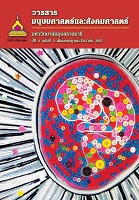การยกระดับความสามารถการคิดวิเคราะห์ด้วยการจัดการเรียนรู้แบบสืบเสาะวิทยาศาสตร์
Main Article Content
บทคัดย่อ
งานวิจัยนี้มีวัตถุประสงค์เพื่อเปรียบเทียบความสามารถด้านการคิดวิเคราะห์ ของนักเรียนชั้นมัธยมศึกษาปีที่ 3 ก่อนและหลังได้รับการจัดการเรียนรู้แบบสืบเสาะทางวิทยาศาสตร์ที่เน้นการคิดวิเคราะห์ พร้อมทั้งศึกษาความก้าวหน้าทางการเรียน และประสิทธิภาพของกระบวนการจัดการเรียนรู้ ขั้นตอนการวิจัยประกอบด้วย การทดสอบก่อนเรียน การจัดการเรียนรู้ตามแผนการจัดการเรียนรู้รวมระยะเวลา 18 ชั่วโมง โดยมีขั้นตอนการจัดการเรียนรู้ 5 ขั้น ได้แก่ ขั้นสร้างความสนใจ ขั้นสำรวจค้นหา ขั้นสร้างคำอธิบาย ขั้นอภิปรายความรู้ และขั้นประเมินผล และการทดสอบหลังเรียน ผลการวิจัยพบว่า รูปแบบการเรียนรู้แบบสืบเสาะทางวิทยาศาสตร์ที่เน้นการคิดวิเคราะห์ทุกขั้นตอน ทำให้ผู้เรียนมีคะแนนความสามารถด้านการคิดวิเคราะห์หลังเรียน (37.10±1.79) สูงกว่าคะแนนความสามารถด้านการคิดวิเคราะห์ก่อนเรียน (19.47±2.91) อย่างมีนัยสำคัญทางสถิติที่ระดับ .05 โดยยกระดับความสามารถด้านการคิดวิเคราะห์จากระดับพอใช้ไปอยู่ในระดับดีมาก ผู้เรียนมีความก้าวหน้าทางการเรียนเฉลี่ยอยู่ในระดับกลาง (<g> = 0.69) นอกจากนี้กระบวนการจัดการเรียนรู้แบบสืบเสาะวิทยาศาสตร์ที่เน้นการคิดวิเคราะห์นี้มีค่าประสิทธิภาพ E1/E2 เท่ากับ 78.80/82.44 ซึ่งสูงกว่าเกณฑ์มาตรฐานที่ตั้งไว้ (75/75) โดยสามารถยกระดับความสามารถด้านการคิดวิเคราะห์ของผู้เรียนได้คลอบคลุมทั้งแบบวิเคราะห์ความสำคัญ วิเคราะห์ความสัมพันธ์ และวิเคราะห์หลักการ
Enhancing Analytical Thinking Ability Using a Science Inquiry Approach
This research aimed to compare the analytical thinking ability of grade 9 students before and after using a science inquiry learning model with an emphasis on analytical thinking. The students’ learning improvement and effectiveness of the model were also analyzed. The research methodology comprised of a pre-test, 18 hours teaching and learning that involved lesson plans with an emphasis on analytical thinking composed of engagement, exploration, explanation, discussion, and evaluation, and a post-test. The results revealed that, after use of the science inquiry learning model with an emphasis on analytical thinking at each step of inquiry, the students recorded an average post-test score in the analytical thinking ability exam of 37.10±1.79, higher than the average pre-test score of 19.47±2.91 at a significance level of .05. The students’ analytical thinking ability improved from a fairly to a very good level. The students had learning improvement at a medium level (<g> = 0.69). In addition, the science inquiry learning model with an emphasis on analytical thinking had the effectiveness (E1/E2) of 78.73/82.44, which is higher than the standard criterion of 75/75. The model was able to improve the students’ analytical thinking ability in prioritizing, relations, and principles.
Article Details
บทความที่ได้รับการตีพิมพ์เป็นลิขสิทธิ์ของวารสารมนุษยศาสตร์และสังคมศาสตร์ มหาวิทยาลัยอุบลราชธานี
ข้อความที่ปรากฏในบทความแต่ละเรื่องในวารสารวิชาการเล่มนี้เป็นความคิดเห็นส่วนตัวของผู้เขียนแต่ละท่านไม่เกี่ยวข้องกับมหาวิทยาลัยอุบลราชธานี และคณาจารย์ท่านอื่นๆในมหาวิทยาลัยฯ แต่อย่างใด ความรับผิดชอบองค์ประกอบทั้งหมดของบทความแต่ละเรื่องเป็นของผู้เขียนแต่ละท่าน หากมีความผิดพลาดใดๆ ผู้เขียนแต่ละท่านจะรับผิดชอบบทความของตนเองแต่ผู้เดียว


